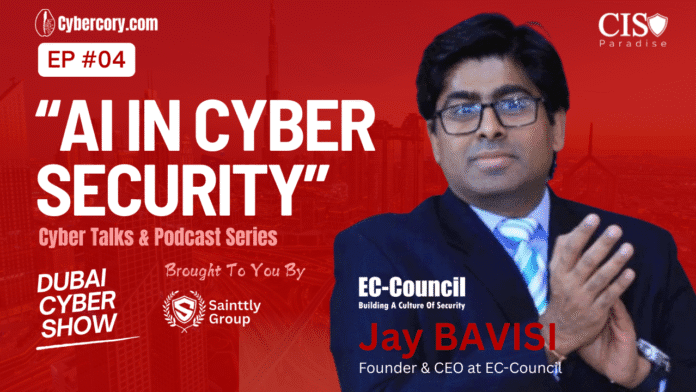Welcome to the Dubai Cyber Show & Podcast Series, where we spotlight the minds shaping the future of cybersecurity. In our 4th episode, titled “AI & Machine Learning in Cybersecurity,” host Ouaissou DEMBELE sits down with none other than Jay Bavisi, the globally recognized Founder and CEO of EC-Council.
Ouaissou DEMBELE, a seasoned cybersecurity expert with over 12 years of experience, is the Co-founder & Group CEO of Sainttly Group, a UAE-based conglomerate comprising Saintynet Cybersecurity, Cybercory.com, and CISO Paradise. As Editor-in-Chief of Cybercory.com, Ouaissou brings deep expertise in purple teaming, GRC, and strategic cybersecurity leadership to the table.
Jay Bavisi, the visionary behind EC-Council, is the creator of the world-renowned Certified Ethical Hacker (C|EH) and other leading infosec certifications. His global influence spans keynote speeches, media appearances, and partnerships with institutions like the International Telecommunications Union and NICE, a White House initiative.
Together, they explore – during the 100 CISO Summit on the August 19th, 2025 in Dubai – the evolving role of AI and machine learning in cybersecurity-raising critical questions that reflect the challenges and opportunities facing professionals worldwide.
Podcast Questions Recap
This episode dives into ten thought-provoking questions, including:
- How is AI changing threat detection?
- Can AI fully replace human analysts?
- What are the risks of AI-driven attacks?
- How can CISOs use AI responsibly?
- Is AI bias a security concern?
These questions are not just technical they touch on ethical, strategic, and operational dimensions of cybersecurity in the age of intelligent automation.
Global Context Summary
The rise of AI in cybersecurity is both a breakthrough and a battleground. As organizations race to adopt AI-powered tools, concerns about algorithmic bias, autonomous threats, and human oversight are becoming central to global security conversations.
Recent incidents involving AI-generated phishing, deepfake scams, and automated vulnerability exploitation highlight the urgency of these discussions. Governments and enterprises alike are grappling with how to regulate, integrate, and trust AI systems in critical infrastructure.
The questions raised in this episode reflect a broader concern: How do we harness AI’s potential without compromising security, ethics, or human judgment? This is not just a technical challenge, it’s a strategic imperative.
Engagement Invitation
We extend our deepest thanks to Jay Bavisi for sharing his insights and vision in this pivotal episode.
- Watch the full episode to hear the full conversation and explore the future of AI in cybersecurity.
- Join the dialogue by commenting with your thoughts, experiences, or questions.
- Share this article with your network to help raise awareness and spark meaningful conversations in the cybersecurity community.
10 Key Takeaways & Advice on AI in Cybersecurity
- AI should enhance-not replace-human decision-making.
Use AI to support analysts, not substitute them. - Bias in AI models is a real threat.
Ensure diverse training data and regular audits. - Generative AI can be weaponized.
Prepare for deepfake phishing and synthetic threats. - CISOs must lead with ethical AI governance.
Define clear policies for responsible AI use. - Threat detection is faster-but not foolproof.
Combine AI with human validation for accuracy. - Build vs. Buy decisions should be strategic.
Evaluate internal capabilities, scalability, and vendor trust. - Measure AI performance with clear KPIs.
Track detection rates, false positives, and response times. - AI should be integrated across security layers.
From SOC automation to endpoint protection, holistic use is key. - Human analysts remain essential.
AI lacks intuition, context, and ethical reasoning. - Stay agile and informed.
The AI landscape evolves rapidly-continuous learning is critical.
Conclusion
This episode with Jay Bavisi offers a timely and strategic look into how AI is reshaping cybersecurity. The questions raised are essential for CISOs, analysts, and policymakers navigating the future of digital defense.


